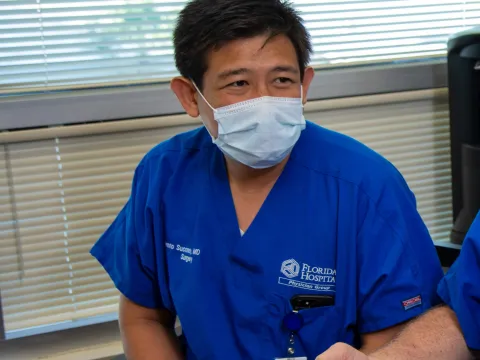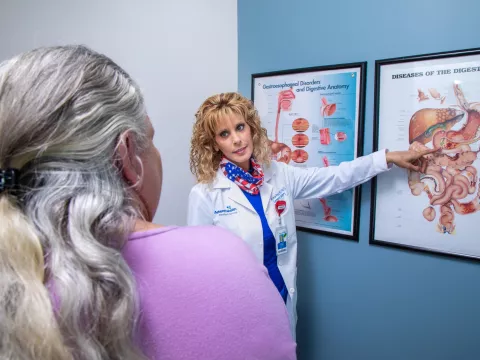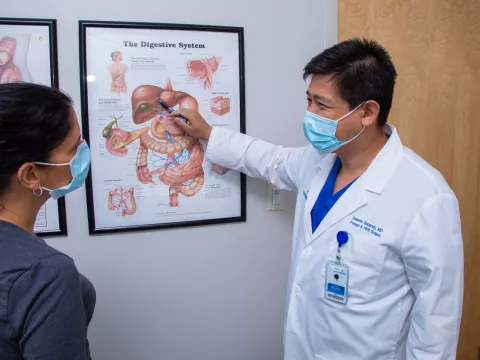- AdventHealth Digestive Health Institute
Choose the health content that’s right for you, and get it delivered right in your inbox.
On May 1, 2021, Emanuel Shapera, MD, gave two presentations about research studies conducted at AdventHealth Digestive Institute Tampa (DI) at the Edward M. Copeland, III, MD, FACS, Research Symposium and Business Meeting of the Florida chapter of the American College of Surgeons (ACS). Dr. Shapera is currently a surgical fellow at DI, studying hepatopancreatobiliary (HPB) and foregut surgery under advanced HPB and foregut surgeons Sharona Ross, MD, FACS, and Alexander Rosemurgy, MD, FACS, and advanced HPB surgeon Iswanto Sucandy, MD, FACS.
Dr. Shapera’s first talk, about the performance of open and robotic surgery to remove colorectal tumors spread to the liver, was among only three Florida Commission on Cancer Abstract Competition presentations out of 10 selected to be featured as podium presentations. His second presentation, comparing robotic surgery to traditional, open surgery for major liver operations, was part of the day’s abstract showcase. DI’s Dr. Ross, who chairs the chapter’s Women in Surgery section committee, served on the Program Committee for this year’s event.
Evaluating Open and Robotic Surgery for Removal of Metastatic Liver Tumors
Dr. Shapera’s podium presentation was entitled “Analysis of Surgical Approach and Tumor Distance to Margin After Liver Resection for Colorectal Liver Metastases.” Colorectal cancer – cancer of the colon or rectum – is the third most common cancer in the United States. If not caught and treated in its early stages, colorectal cancer commonly spreads to the liver. (Note: This is why those dreaded regular colonoscopies are important!) About half of all colorectal cancers have or will eventually spread, or metastasize, to the liver. For about 2 in 5 people in this situation, the liver is the only place the cancer has spread. This gives them a possibility of a cure if the cancer tumors in the liver can be completely removed.
In the featured study, Dr. Rosemurgy, Dr. Sucandy, Dr. Ross and the other DI researchers sought to find out which surgical approach helped surgeons remove metastatic liver tumors more completely. They also looked at whether or not the distance between the cancer tumor and the edge of the surgically removed tissue impacted survival rates. The researchers hypothesized that the more completely metastatic liver tumors could be removed, the longer average survival would be.
Their study involved 56 consecutive patients who had surgery for metastatic liver tumors at DI between 2013 and 2021. The study compared each surgical approach and the distance between the tumor and the edge of the removed tissue. Based on these factors, the researchers compared different measurements such as how much time each operation took, postsurgical complications and overall patient survival.
Robotic Surgery Tends to Result in More Complete Tumor Removal; Is at Least as Good as Open Surgery
Dr. Rosemurgy, Dr. Sucandy, Dr. Ross and the researchers found that while the robotic approach took more time, it was associated with having a wider margin between the tumor and the edge of the removed tissue – a greater likelihood that all the cancer had been removed. This answers questions about whether the robotic technique might compromise surgical margins, potentially leading to poorer outcomes. This study clarifies that this need not be a concern. Also, robotic operations involved average hospital stays of 4-5 days compared to a 7-day stay with the open approach.
However, the researchers found a peculiar inconsistency in survival rates based on the size of the margin between the tumor and the edge of the removed tissue. When these margins were equal to or less than 1 mm, median survival was just over four years; when they were 1 cm or more, median survival was seven years or more. However, the middle group with margins between 1 mm and 1 cm had a median survival of only two years.
The surgical approach itself might not account for these odd findings. Other factors such as tumor grade, genetic mutations and a patient’s overall health might have more of an impact on survival. Patients with the narrowest margins tended to have open surgery in which the tumor was removed with an ultrasonic dissector device that uses a suction mechanism. It is possible that this approach removed more, cancer-free tissue than could be recorded in the specimen and therefore resulted in better than expected outcomes.
The researchers concluded that with metastatic liver tumors, several factors influence survival. Surgical approach and tumor margins may not be as significant as other factors, but there are still benefits that would recommend a robotic approach over an open one. The study found that patients who had robotic surgery to remove colorectal tumors spread to the liver did at least as well as those who had an open operation. Also, given the shorter hospital stay, robotic surgery is the preferred approach for most patients with metastatic liver tumors.
Comparing a Robotic Approach to a Traditional Open Operation for Major Liver Surgery
In his second presentation, “Robotic vs. ‘Open’ Major Hepatectomy: A Propensity Score Matching Study,” Dr. Shapera reported on a study that compared outcomes between open and robotic liver surgery. All 183 patients enrolled in the study needed a major hepatectomy, or removal of three or more continuous segments of the liver.
Patients were assigned to receive their liver operations either as open or robotic surgery. The open, traditional approach involves a large abdominal incision. In the U.S. today, almost 9 in 10 liver operations are performed in this open fashion. In contrast, robotic liver surgery is done with the da Vinci® Surgical System. This allows patients to have a minimally invasive operation, involving a few small incisions rather than a large one. Under Dr. Sucandy, Dr. Rosemurgy and Dr. Ross, DI has become one of the nation’s major centers for robotic liver surgery. Since late 2016, our surgeons have performed almost 400 robotic liver operations, making DI one of the highest volume centers in the U.S.
After the patients’ operations, the study used a propensity matching system to create two groups of 42 patients each – an open surgery group and a robotic surgery group. Each group was closely identical in terms of body mass index (BMI), tumor size, type of liver cancer and how much of the liver was removed. Matching the groups of patients this way ensured that the surgical approach would be the only factor under study. Otherwise, if healthier patients ended up in one of the two groups, the scales might be tipped towards the specific operation the healthier group received.
Robotic Liver Surgery: Shorter Hospital Stays & Longer Cancer Survival
The results showed that robotic liver surgery was slightly more time-consuming than open liver surgery: 13 minutes longer on average, although both approaches took less than five hours. However, patients who had robotic liver surgery had an average hospital stay of 4 days, about a third less than the average 6-day stay with open surgery. Also, people who had robotic surgery had lower estimated blood loss during their operations – about a third less than with open surgery.
Perhaps most interestingly of all, patients who received the robotic approach to remove a cancerous liver tumor ended up living significantly longer than those who had open surgery for cancer. This was especially true for people with primary liver cancer, particularly hepatocellular carcinoma (HCC) or cancer of the liver cells themselves. On this basis, the DI surgeons and researchers concluded that the robotic approach is the preferred one for patients who need major liver surgery.
If you or a loved one needs a liver operation, find out if robotic surgery is a possibility. Call Call844-650-5950 for a consultation with an advanced HPB surgeon at the Digestive Institute Tampa. We offer appointments within 5 business days for people newly diagnosed with a digestive cancer.





